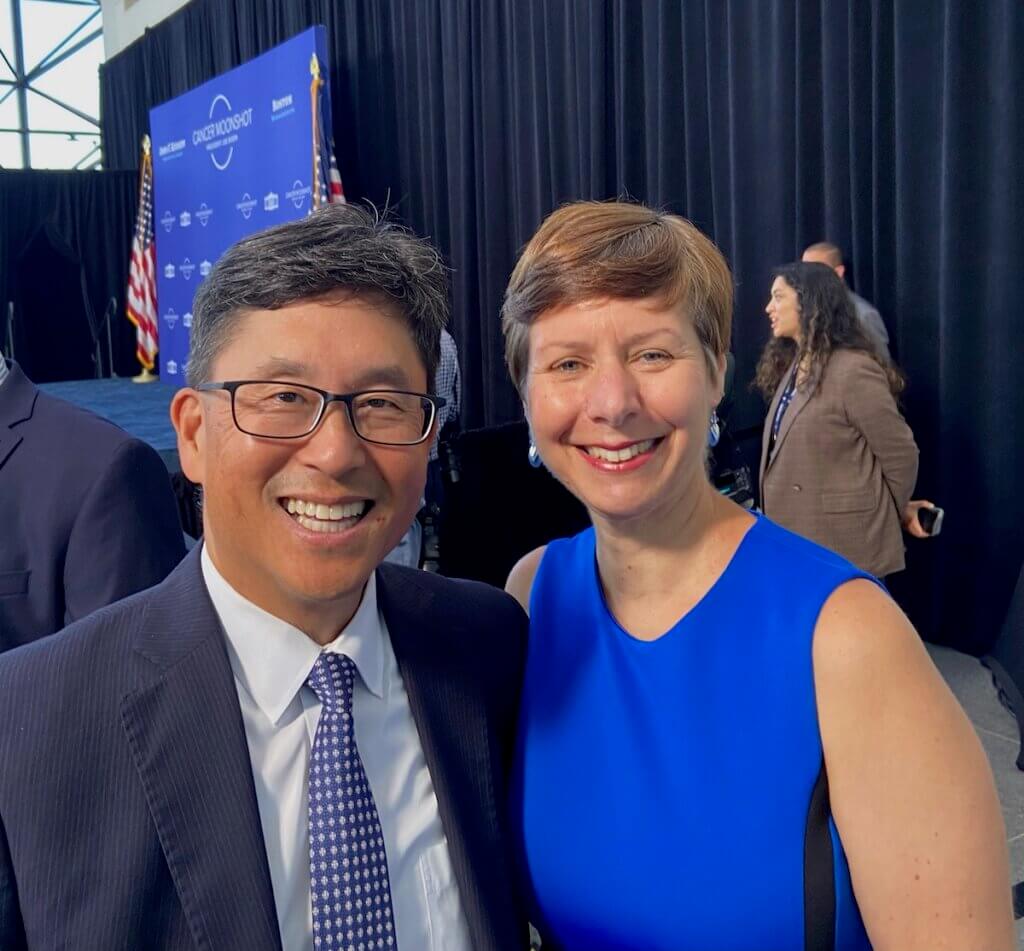Sixty years to the day after President John F. Kennedy’s landmark speech pledging to land an American on the moon by the end of the decade, President Biden came to Boston on September 12 to recommit the country to a different kind of moonshot — “ending cancer as we know it.”
Speaking at the John F. Kennedy Presidential Library and Museum, Biden described his efforts to “supercharge” the Cancer Moonshot initiative launched during the Obama Administration by transforming it from a piece of legislation into a movement. He reiterated the goal he’d set earlier this year of reducing U.S. cancer deaths by at least 50% over the next 25 years while providing more support to patients and caregivers.
Biden portrayed the country, both in the early 1960s and today, as poised at an “inflection point.” A nation that was grappling with a Cold War and unrest over civil rights “faced a choice — to move forwards or to move backwards, to build the future or obsess about the past, to be a nation of unity and hope or a nation of division, violence and hatred,” he remarked. Kennedy seized the moment with a speech about “America’s possibilities” and a challenge “we are unwilling to postpone.”
Today, Biden said, “I believe we can usher in the same unwillingness to postpone, the same national purpose…to end cancer as we know it and even cure cancers once and for all.”
He portrayed the revitalized Cancer Moonshot not just as a scientific endeavor but a cause that can rally Americans toward a common goal at a time when unity seems elusive.
“We know that cancer does not discriminate between red and blue, Republican and Democrat. Beating cancer is something we can do together,” he said.
A Dana-Farber endorsement
Dana-Farber Executive Vice President and Chief Operating Officer William Hahn, MD, PhD, who attended the event, said advances in cancer genomics, immunotherapy, and early detection make this an ideal time for the kind of effort Biden has spearheaded.
“We’re at an important juncture where a lot of progress has been made and there’s a lot of potential, but there’s a lot of hard work that will require more than the usual people involved,” Hahn said after the speech. “[Biden’s] vision is just in line with what’s needed.”

Biden described some of the actions he’s taken as part of the Moonshot, including forming a “Cancer Cabinet” with representatives from NASA, the Defense Department, Health and Human Services, and the Labor Department. He announced the appointment of Renee Wegrzyn, PhD, a Boston biotech executive and former government scientist, as the inaugural director of ARPA-H, a new federal agency charged with driving breakthroughs in medicine — in cancer as well as Alzheimer’s disease, diabetes, and other diseases. He stated that he’d signed an executive order that morning requiring the federal government to ensure that biotechnologies invented in the United States are manufactured in the United States. And a new Cancer Moonshot Scholar program has been launched to support the next generation of cancer scientists.
Biden sketched a vision of the kind of advances and treatments that sustained research can achieve: “vaccines that can prevent cancer, molecular ZIP codes that could deliver drugs or gene therapy precisely to the right tissues, a simple blood test during an annual physical that could detect cancer early, when the chances are cure are best, getting a simple shot instead of a grueling course of chemotherapy.”
Biden ended with an appeal to patients with cancer, and to their families and caregivers, to share their experiences and push for progress. “There’s nothing beyond our capacity when we work together as the United States of America.”
